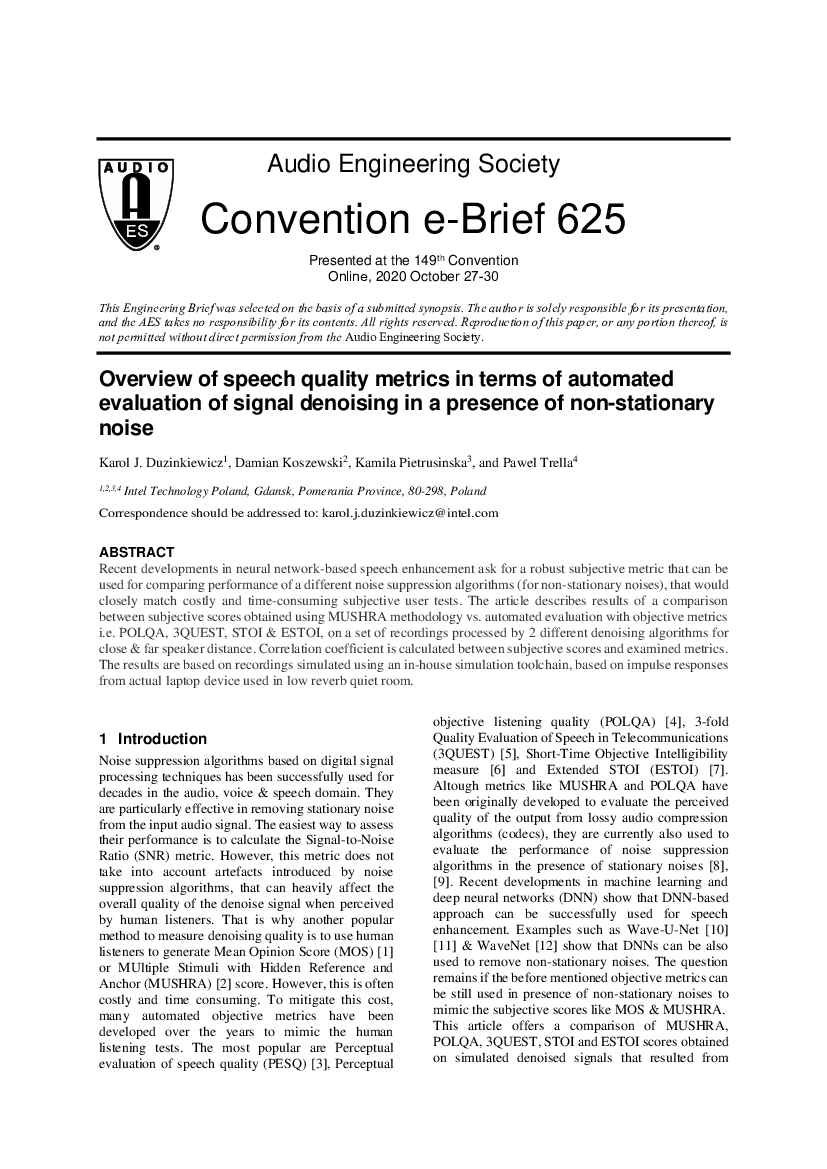Home / Publications / E-library page
You are currently logged in as an
Institutional Subscriber.
If you would like to logout,
please click on the button below.
Home / Publications / E-library page
Only AES members and Institutional Journal Subscribers can download
Recent developments in neural network-based speech enhancement ask for a robust subjective metric that can be used for comparing performance of a different noise suppression algorithms (for non-stationary noises), that would closely match costly and time-consuming subjective user tests. The article describes results of a comparison between subjective scores obtained using MUSHRA methodology vs. automated evaluation with objective metrics i.e. POLQA, 3QUEST, STOI & ESTOI, on a set of recordings processed by 2 different denoising algorithms for close & far speaker distance. Correlation coefficient is calculated between subjective scores and examined metrics. The results are based on recordings simulated using an in-house simulation toolchain, based on impulse responses from actual laptop device used in low reverb quiet room.
Author (s): Duzinkiewicz, Karol; Koszewski, Damian; Pietrusinska, Kamila; Trella, Pawel
Affiliation:
Intel Technology Poland, Gdansk, Poland
(See document for exact affiliation information.)
AES Convention: 149
Paper Number:625
Publication Date:
2020-10-06
Import into BibTeX
Session subject:
Perception
Permalink: https://aes2.org/publications/elibrary-page/?id=20911
(478KB)
Click to purchase paper as a non-member or login as an AES member. If your company or school subscribes to the E-Library then switch to the institutional version. If you are not an AES member Join the AES. If you need to check your member status, login to the Member Portal.

Duzinkiewicz, Karol; Koszewski, Damian; Pietrusinska, Kamila; Trella, Pawel; 2020; Overview of speech quality metrics in terms of automated evaluation of signal denoising in a presence of non-stationary noise [PDF]; Intel Technology Poland, Gdansk, Poland; Paper 625; Available from: https://aes2.org/publications/elibrary-page/?id=20911
Duzinkiewicz, Karol; Koszewski, Damian; Pietrusinska, Kamila; Trella, Pawel; Overview of speech quality metrics in terms of automated evaluation of signal denoising in a presence of non-stationary noise [PDF]; Intel Technology Poland, Gdansk, Poland; Paper 625; 2020 Available: https://aes2.org/publications/elibrary-page/?id=20911
@article{duzinkiewicz2020overview,
author={duzinkiewicz karol and koszewski damian and pietrusinska kamila and trella pawel},
journal={journal of the audio engineering society},
title={overview of speech quality metrics in terms of automated evaluation of signal denoising in a presence of non-stationary noise},
year={2020},
number={625},
month={october},}
TY – paper
TI – Overview of speech quality metrics in terms of automated evaluation of signal denoising in a presence of non-stationary noise
AU – Duzinkiewicz, Karol
AU – Koszewski, Damian
AU – Pietrusinska, Kamila
AU – Trella, Pawel
PY – 2020
JO – Journal of the Audio Engineering Society
VL – 625
Y1 – October 2020